Marking the occasion of World AIDS Day, Union Minister of Health and Family Welfare, Shri Jagat Prakash Nadda inaugurated the World AIDS Day 2024 commemoration in the presence of Dr. Mohan Yadav, Chief Minister of Madhya Pradesh at the Devi Ahilya Vishwavidyalaya Auditorium, in Indore, Madhya Pradesh, today. This year’s theme, “Take the Rights Path”, emphasizes the importance of ensuring equal rights, dignity, and access to healthcare for all, particularly for those living with or affected by HIV/AIDS.
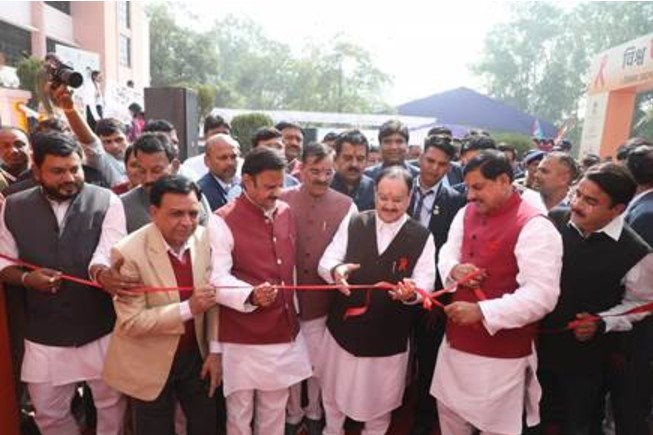
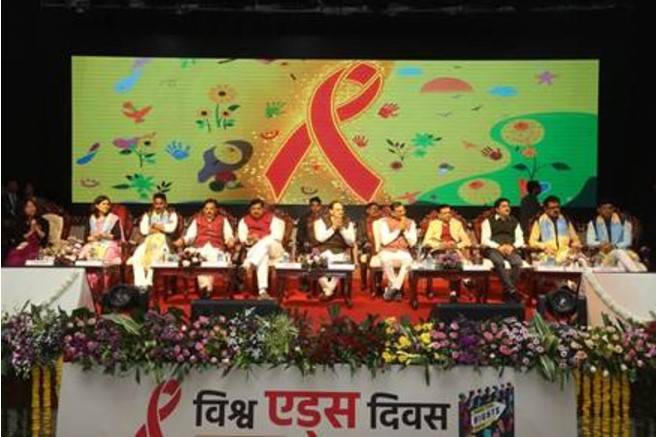
In keeping with the World AIDS Day 2024 theme, ‘Take the rights path’, Shri JP Nadda reflected on the Government of India's ongoing commitment to safeguarding the rights of people living with HIV/AIDS, emphasizing legal protections, healthcare access, and societal change. He said, “World AIDS Day is a moment to reiterate that we are all together in the fight against AIDS as well as to remember and re-dedicate the efforts of those people who have fought against this disease and lost their loved ones as well.”
The Union Minister highlighted the government's unwavering approach to tackling HIV/AIDS, citing the ongoing Phase V of the National AIDS and STD Control Program. He underlined the sustained efforts by NACO and State AIDS Control Societies which ensured low HIV epidemic level in India over the years with new infections in the country in 2023 almost 44% lower than in 2010 while AIDS related deaths declined by 79%.
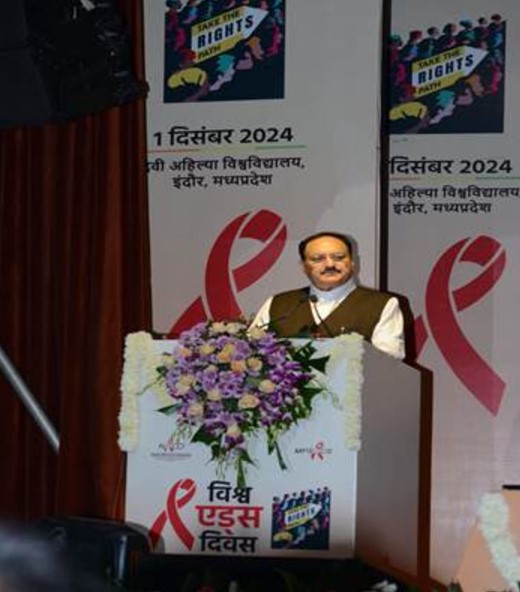
The Union Health Minister emphasized on three important directives for people to pursue regarding the fight against AIDS. First, he emphasized the importance of caution to prevent HIV/AIDS infections, noting that people can contract the virus not only through sexual intercourse but also through other routes. Second, he stressed the need for adopting a healthy lifestyle, including proper nutrition, exercise, and sleep, to prevent many illnesses. Additionally, he highlighted the significance of raising awareness and combating stereotypes through various initiatives like village meetings, school performances, and educational campaigns. He also urged authorities to evaluate the effectiveness of their AIDS control efforts and address any gaps.
Shri Nadda underscored the importance of treating HIV positive people with a human angle. Highlighting that every person has the right to a dignified life, he urged everyone to include people with HIV in the mainstream. “Contrary to some beliefs, any person with HIV can live lifelong today and can also have a healthy child without HIV infection”, he said.
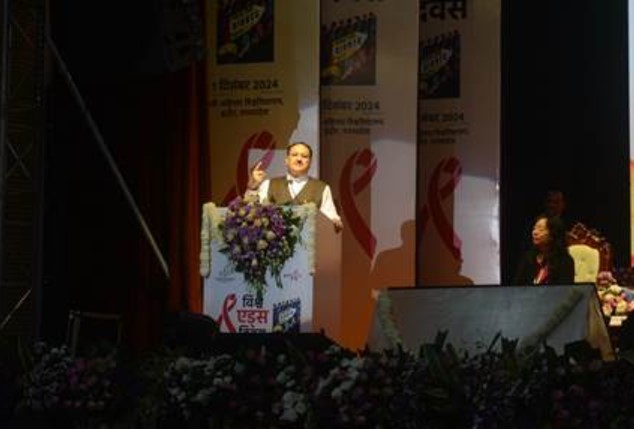
Expressing his admiration for health workers for handling such diseases with extreme care and dedication, Shri Nadda noted that they carry on their work despite being exposed to infected people at all times and emphasized on the need to protect them.
The Union Minister highlighted the long struggle faced by India in its fight against AIDS. “From a time when there was no medicine for AIDS, to dealing with over-expensive medicines to now becoming a net supplier of HIV medicines to the world, India has come a long way in its fight against AIDS”, he stated. He noted that today India is taking a lead in AIDS control by producing the most affordable as well as effective medicines and sharing them with the neediest. He also stated that the Union government provides free medicines for AIDS patients.
Underscoring the Indian government’s commitment to achieve the Sustainable Develeopment Goals (SDGs) by 2030, Shri Nadda said that the number of new HIV cases in India has decreased by 44% since 2010 which is higher than the global reduction rate of 39%. There has also been a 79% decline in deaths due to AIDS.
He noted that India has adopted a 90-90-90 target for combating AIDS which includes the target of detecting 90% cases of AIDS in the country, 90% of people to be treated with antiretroviral therapy (ART) and 90% to have their viral load suppressed. He stated that this target was later increased to 95-95-95, out of which 81% people with AIDS have been identified, 88% are being given ART and viral load of 97% identified people has been suppressed.
On the occasion, Shri Nadda also congratulated the Madhya Pradesh government for attaining significant strides in the healthcare sector. Earlier, he also visited an exhibition set up by NACO and interacted with the delegates and officials there.
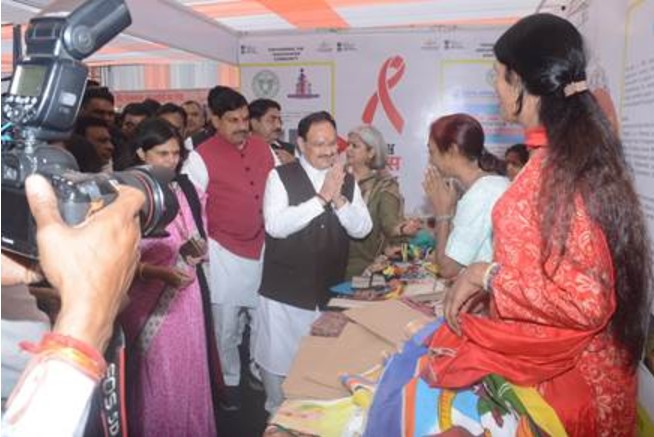
The Chief Minister of Madhya Pradesh, Dr. Mohan Yadav expressed his elation at the fact that people from the lowest strata of the society are benefitting from the government’s efforts at AIDS control. He said, “under the leadership of the Hon’ble Prime Minister, Shri Narendra Modi, India has successfully managed the Covid-19 pandemic and is working with the vision of eradicating a range of epidemic diseases by 2030, including AIDS”.
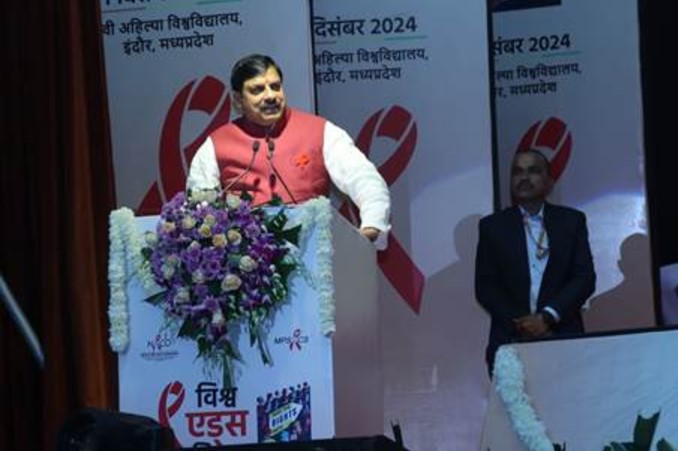
Dr Yadav highlighted that with the change in National Medical Council guidelines, the process of opening new medical colleges has become more streamlined and transparent.
On strengthening of medical infrastructure in Madhya Pradesh, Dr. Yadav emphasized that while earlier there were only five medical colleges in Madhya Pradesh, today there are 31 medical colleges in the state. He also pointed out that there will be 50 medical colleges operative in the state in the next two years.
Dr Yadav further stated that Madhya Pradesh aims to achieve the target of eradicating AIDS as a public health threat by 2028, two years ahead of the 2030 SDG goal. Emphasizing that the government is working with the principle of “Live and let live”, he stated that Madhya Pradesh is leading the way in Ayushman Bharat Vay Vandana Yojana as well as in health indicators like IMR and delivery of health services to remote areas etc.
Background
Aligned with the theme of the United Nations Programme on HIV/AIDS (UNAIDS), ‘Take the Rights Path’, this World AIDS Day 2024 emphasized on awareness, and rights-based approaches to treatment and eliminate discrimination against those affected by HIV/AIDS. The National AIDS Control Organization (NACO), under the Ministry of Health & Family Welfare (MoHFW), Government of India has been observing World AIDS Day annually on December 1 since 1992. Bringing together communities, youth, beneficiaries, and various organizations, these observances have been fostering collaboration to address the challenges and advancements aiming at the global goal of ending HIV/AIDS by 2030.
This year the programme featured impactful activities, such as an innovative exhibition showcasing key programmatic components like the digital ecosystem adopted by NACO, community engagement, achievements made through the campaign-based approach, and a variety of hand-crafted items made by the beneficiaries.
The event also included the launch of NACO's theme song, brought to life through a live performance by its original singers— Dev Negi, Moko Koza and Agsy. The song conveys an uplifting message of hope, optimism, and unity. It envisions a world inspiring collective action toward building a better world, reflecting the core values of empathy, equality, and resilience. The song aims to motivate individuals to come together and work for a future where everyone can live without fear or discrimination, echoing the theme of World AIDS Day.
In addition, the Union Health Minister honoured two beneficiaries of the National AIDS Control Programme (NACP) who have been directly affected by HIV/AIDS. They shared their personal journeys, showcasing the significant progress they have made in their fight against the disease. Their stories emphasized the crucial role of access to treatment, support, and awareness, which have been key to their resilience and empowerment.
The event witnessed the release and launch of the following documents:
SANKALAK 6th Edition
India HIV Estimates 2023 – Technical Report
Coffee Table Book (Intensified IEC Campaign)
Prevention Progress Update 2023-2024 (Fourth Edition)
Research Compendium Volume II
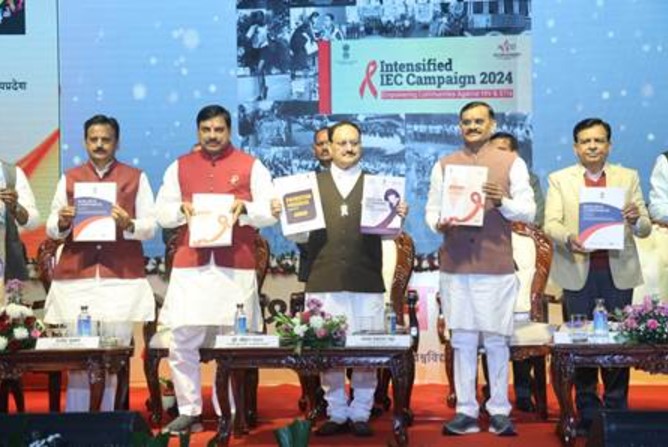
The event brought together diverse stakeholders, including policymakers, representatives from government, civil society, communities, youth, and development partners with a live stream available nationwide to encourage widespread participation uniting efforts to advance equity in healthcare and inspire collective action against the epidemic.
Brief on Releases for World AIDS Day 2024:
Sankalak 6th Edition: “Sankalak” is the evidence driven flagship report of National AIDS and STD Control Programme. The 6th edition of Sankalak being released today details the status and progress of National AIDS & STD response in the year 2023-2024. This document offers data overview of programmatic aspects across prevention-detection-treatment domains and highlights the specific areas that require quick attention for each State and Union Territory of India.
India HIV Estimates 2023 – Technical Report: HIV burden estimation is carried out annually under the Programme by employing globally recommended software and following rigorous scientific methods. HIV Estimates 2023 provides updated evidence of level and trend of the HIV epidemic in India, on the key parameters of HIV prevalence, incidence, AIDS-related mortality, and elimination of vertical transmission of HIV. This report presents the method and findings of the ‘HIV Estimation 2023’ of the latest round.
Coffee Table Book (Intensified IEC Campaign): The Intensified IEC Campaign (IIC) is an initiative implemented by NACO and the State AIDS Control Societies (SACS) across the country. Launched on 12th August 2024, coinciding with International Youth Day, the campaign's primary goals were to enhance knowledge and understanding of HIV and STIs among the general population, promote safe practices, reduce stigma and discrimination and create demand for HIV/STI services.
IIC included a variety of activities, such as village-level meetings, folk performances, school outreach programs, college awareness initiatives, social media engagement, slum interventions and door-to-door campaigns. This extensive campaign has gained widespread publicity and has successfully engaged the health system, frontline health workers, panchayat members and youth in raising awareness and reducing the stigma associated with HIV/AIDS. Additionally, the campaign has involved State leaderships, including Chief Ministers, Health Ministers, notable dignitaries and social influencers. This coffee table book aims to highlight and record the major achievements and activities covered under the Intensified IEC campaign.
Prevention Progress Update 2023-2024 (Fourth Edition): The prevention progress update 2023-24, NACO aims to update the progress, analyse and disseminate on the important Prevention activities and services provided to HRGs including Prison Population, Bridge Populations, and other at risk and vulnerable populations during 2023-24 under NACP Phase V.
Research Compendium Volume II: To consolidate the knowledge and evidence gathered from the state-specific studies, NACO is bringing out volume II of the Research Compendium, highlighting key findings and recommendations. The Research Compendium Volume II aims to share evidence generated from studies undertaken by States in FY 2022-23, with key stakeholders, including scientific community, policy makers, programme managers, communities, vulnerable and marginalised groups. It includes insights and recommendations from 65 abstracts based on studies conducted in 2022-23.
Shri Rajendra Shukla and Shri Jagdish Devda, Deputy Chief Ministers of Madhya Pradesh; Shri Tulsiram Silawat, Cabinet Minister for Water Resources, Madhya Pradesh; Shri Narendra Shivaji Patel, Minister of State for Public Health and Medical Education, Shri Vishnu Dutt Sharma and Shri Shankar Lalwani, Members of Parliament (LS) from Madhya Pradesh; Shri Pushyamitra Bhargav, Mayor, Indore Municipal Corporation; Smt. Punya Salil Srivastava, Union Health Secretary; Smt. Hekali Zhimomi, Addl. Secretary, Union Health Ministry; Dr Roderico H. Ofrin, WHO Representative to India and other distinguished guests also graced the event.